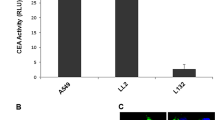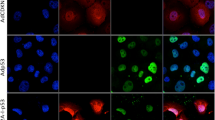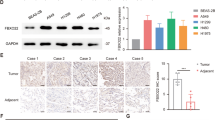Abstract
Lung cancer is a leading cause of cancer death due to the high incidence of metastasis; therefore, novel and effective treatments are urgently needed. A current strategy is cancer-specific targeted gene therapy. Although many identified that cancer-specific promoters are highly specific, they tend to have low activity compared with the ubiquitous cytomegalovirus (CMV) promoter, limiting their application. We developed a targeted gene therapy expression system for lung cancer that is highly specific with strong activity. Our expression vector uses the survivin promoter, highly expressed in many cancers but not normal adult tissues. We enhanced the survivin promoter activity comparable to the CMV promoter in lung cancer cell lines using an established platform technology, whereas the survivin promoter remained weak in normal cells. In mouse models, the transgene was specifically expressed in the lung tumor tissue, compared with the CMV promoter that was expressed in both normal and tumor tissues. In addition, the therapeutic gene BikDD, a mutant form of pro-apoptotic Bcl2 interacting killer, induced cell killing in vitro, and inhibited cell growth and prolonged mouse survival in vivo. Importantly, there was virtually no toxicity when BikDD was expressed with our expression system. Thus, the current report provides a therapeutic efficacy and safe strategy worthy of development in clinical trials treating lung cancer.
This is a preview of subscription content, access via your institution
Access options
Subscribe to this journal
Receive 50 print issues and online access
$259.00 per year
only $5.18 per issue
Buy this article
- Purchase on Springer Link
- Instant access to full article PDF
Prices may be subject to local taxes which are calculated during checkout






Similar content being viewed by others
References
Altieri DC . (2003a). Survivin, versatile modulation of cell division and apoptosis in cancer. Oncogene 22: 8581–8589.
Altieri DC . (2003b). Validating survivin as a cancer therapeutic target. Nat Rev Cancer 3: 46–54.
Ambrosini G, Adida C, Altieri DC . (1997). A novel anti-apoptosis gene, survivin, expressed in cancer and lymphoma. Nat Med 3: 917–921.
Chen JS, Liu JC, Shen L, Rau KM, Kuo HP, Li YM et al. (2004). Cancer-specific activation of the survivin promoter and its potential use in gene therapy. Cancer Gene Ther 11: 740–747.
Day CP, Rau KM, Qiu L, Liu CW, Kuo HP, Xie X et al. (2006). Mutant Bik expression mediated by the enhanced minimal topoisomerase II alpha promoter selectively suppressed breast tumors in an animal model. Cancer Gene Ther 13: 706–719.
Fitzsimons HL, Bland RJ, During MJ . (2002). Promoters and regulatory elements that improve adeno-associated virus transgene expression in the brain. Methods 28: 227–236.
Fukazawa T, Maeda Y, Durbin ML, Nakai T, Matsuoka J, Tanaka H et al. (2007). Pulmonary adenocarcinoma-targeted gene therapy by a cancer- and tissue-specific promoter system. Mol Cancer Ther 6: 244–252.
Gunther M, Wagner E, Ogris M . (2005). Specific targets in tumor tissue for the delivery of therapeutic genes. Curr Med Chem Anticancer Agents 5: 157–171.
Hay RJ, Reid YA, McClintock PR, Chen TR, Macy ML . (1996). Cell line banks and their role in cancer research. J Cell Biochem Suppl 24: 107–130.
Hoffman WH, Biade S, Zilfou JT, Chen J, Murphy M . (2002). Transcriptional repression of the anti-apoptotic survivin gene by wild type p53. J Biol Chem 277: 3247–3257.
Huang L, Hung M-C, Wagner E . (2005). Non-Viral Vectors for Gene Therapy 2nd edn Part I & Part II. edn Elsevier Academic Press: San Diego, CA.
Jemal A, Siegel R, Ward E, Hao Y, Xu J, Murray T et al. (2008). Cancer statistics, 2008. CA Cancer J Clin 58: 71–96.
Li F, Ling X . (2006). Survivin study: an update of ‘what is the next wave’? J Cell Physiol 208: 476–486.
Li YM, Wen Y, Zhou BP, Kuo HP, Ding Q, Hung MC . (2003). Enhancement of Bik antitumor effect by Bik mutants. Cancer Res 63: 7630–7633.
McLemore TL, Eggleston JC, Shoemaker RH, Abbott BJ, Bohlman ME, Liu MC et al. (1988). Comparison of intrapulmonary, percutaneous intrathoracic, and subcutaneous models for the propagation of human pulmonary and nonpulmonary cancer cell lines in athymic nude mice. Cancer Res 48: 2880–2886.
Nigg EA . (2001). Mitotic kinases as regulators of cell division and its checkpoints. Nat Rev Mol Cell Biol 2: 21–32.
O'Connor DS, Schechner JS, Adida C, Mesri M, Rothermel AL, Li F et al. (2000). Control of apoptosis during angiogenesis by survivin expression in endothelial cells. Am J Pathol 156: 393–398.
Oshikiri T, Miyamoto M, Hiraoka K, Shichinohe T, Kawarada Y, Kato K et al. (2006). Transcriptional targeting of adenovirus vectors with the squamous cell carcinoma-specific antigen-2 promoter for selective apoptosis induction in lung cancer. Cancer Gene Ther 13: 856–863.
Ramirez RD, Sheridan S, Girard L, Sato M, Kim Y, Pollack J et al. (2004). Immortalization of human bronchial epithelial cells in the absence of viral oncoproteins. Cancer Res 64: 9027–9034.
Retzer-Lidl M, Schmid RM, Schneider G . (2007). Inhibition of CDK4 impairs proliferation of pancreatic cancer cells and sensitizes towards TRAIL-induced apoptosis via downregulation of survivin. Int J Cancer 121: 66–75.
Russ V, Wagner E . (2007). Cell and tissue targeting of nucleic acids for cancer gene therapy. Pharm Res 24: 1047–1057.
Templeton NS, Lasic DD, Frederik PM, Strey HH, Roberts DD, Pavlakis GN . (1997). Improved DNA: liposome complexes for increased systemic delivery and gene expression. Nat Biotechnol 15: 647–652.
Tsai MF, Wang CC, Chang GC, Chen CY, Chen HY, Cheng CL et al. (2006). A new tumor suppressor DnaJ-like heat shock protein, HLJ1, and survival of patients with non-small-cell lung carcinoma. J Natl Cancer Inst 98: 825–838.
Xie X, Xia W, Li Z, Kuo HP, Liu Y, Ding Q et al. (2007). Targeted expression of BikDD eradicates pancreatic tumors in noninvasive imaging models. Cancer Cell 12: 52–65.
Zaffaroni N, Pennati M, Daidone MG . (2005). Survivin as a target for new anticancer interventions. J Cell Mol Med 9: 360–372.
Acknowledgements
This work was supported by Grants from NRPGM in DOH97-TD-G-111-041 and MDACC SPORE grants in pancreatic (P20 CA101936) and breast (1P50 CA116199) cancer (to M-C Hung) and DOH97-TD-111-TM003 (to L-Y Li). YP Sher was also supported by a postdoctoral fellowship award from the National Health Research Institutes, Taiwan (PD9602). In memory of Mr Nan-Tu Huang, the late Chairman of Wei-Chuan Group in Taiwan for his courageous battle in lung cancer.
Author information
Authors and Affiliations
Corresponding authors
Additional information
Supplementary Information accompanies the paper on the Oncogene website (http://www.nature.com/onc)
Rights and permissions
About this article
Cite this article
Sher, YP., Tzeng, TF., Kan, SF. et al. Cancer targeted gene therapy of BikDD inhibits orthotopic lung cancer growth and improves long-term survival. Oncogene 28, 3286–3295 (2009). https://doi.org/10.1038/onc.2009.187
Received:
Revised:
Accepted:
Published:
Issue Date:
DOI: https://doi.org/10.1038/onc.2009.187
Keywords
This article is cited by
-
ADAM9 enhances CDCP1 protein expression by suppressing miR-218 for lung tumor metastasis
Scientific Reports (2015)
-
Signaling cross-talk in the resistance to HER family receptor targeted therapy
Oncogene (2014)
-
Efficient systemic DNA delivery to the tumor by self-assembled nanoparticle
Journal of Nanoparticle Research (2014)
-
Targeted endostatin-cytosine deaminase fusion gene therapy plus 5-fluorocytosine suppresses ovarian tumor growth
Oncogene (2013)
-
Targeted hepatocellular carcinoma proapoptotic BikDD gene therapy
Oncogene (2011)



